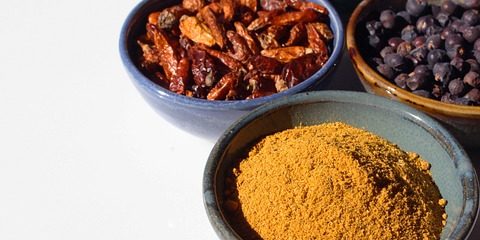Common Culinary Herbs and their Medicinal Uses
Not only do these herbs add spice and flavor to our favorite dishes, they have powerful medicinal properties too! Unsurprisingly, all of these classic culinary herbs aid in digestion, but here are some of the other health benefits you can receive from using these herbs medicinally.
Black Pepper
Piper nigrum
In some herbal traditions, Black Pepper is considered to be almost as much of a panacea as Ginger, and indeed it performs many of the same functions as Ginger. It rids the body of excess mucous and boosts circulation. It stimulates digestion, aiding the liver in the breakdown of fats and heavy foods. While Black Pepper flushes out toxins from the colon, it recirculates vital nutrients throughout the body and increases absorption of medicines and food nutrients.
Black Pepper is considered to be a metabolic stimulant and is a key ingredient in Ayurvedic weight loss formulas.
Black Pepper is often found in formulas for treating congestion, stagnation, and poor circulation. Its high essential oil content makes it helpful for killing unfriendly pathogens, expelling mucous, and increasing circulation throughout the body.
Externally, Black Pepper is a useful disinfectant for wounds. It draws boils to the surface of the skin. When infused in oil or ghee, Black Pepper can help soothe surface inflammation on the skin.
Cinnamon
Cinnamomum zeylandicum
Sweet, spicy cinnamon is a powerful medicinal herb. In studies, half a teaspoon of Cinnamon a day significantly lowered blood glucose levels and cholesterol in people with type 2 diabetes.
Cinnamon is particularly helpful to eat after or during a sugary dessert. It keeps blood sugar from spiking, and it encourages sugar to pass through the digestive system quickly instead of being stored as fatty reserves.
Cinnamon is a warming, stimulating herb. It is very helpful for people with general weakness and muscle pain. It encourages strong digestion and helps clear stagnation and congestion from the body. It is a circulatory stimulant, aids in cases of diarrhea, and eases the pain of rheumatism as well.
Cinnamon essential oil is effective as a pain reliever for toothache, especially when combined with Clove oil.
Cardamom
Elattaria cardamomum
Aromatic cardamom is a cooling, anti-inflammatory herb. It discourages acid reflux and is especially helpful for gas and griping pains in the digestive system. Cardamom stimulates the salivary glands and increases appetite.
Cardamom’s high essential oil content makes it anti-microbial and disinfectant. It clears excess mucous from the lungs and digestive system, and it helps prevent respiratory infections.
Adding Cardamom to coffee reduces the harsh effects of coffee on the body, and it adds a good flavor. In Chinese medicine, Cardamom acts as a kidney tonic.
Cardamom is a classic herb for oral health. It is especially helpful in cases of gum disease and other inflammatory conditions of the mouth.
Fennel
Foeniculum vulgare
Fennel is another excellent gas-relieving digestive stimulant. It encourages peristalsis and relieves spasms in the digestive tract. Fennel is also a friend to the lungs, helping to break up and expel mucous. It is often used to soothe coughs and bring up phlegm from the lungs. It adds a sweet, pleasant flavor to cough formulas.
Fennel is often used by nursing mothers to increase the flow of milk, and to sweeten it as well.
The pleasant, warming essential oil of Fennel is known to ease muscle and joint pain, especially due to rheumatism. In aromatherapy, Fennel essential oil increases mental clarity and improves mood and memory recall.
Topically, Fennel tea compresses can be applied to the eyes to relieve conjunctivitis and eyelid inflammation.
Cumin
Cuminum cyminum
Cumin is best known as a carminative, gas-relieving herb, but it is also effective as an anti-spasmodic and a stimulant. It is strengthening to a weakened digestive system. The smell of Cumin activates our salivary glands, stimulating the digestive processes before the spice even enters our mouth. Cumin’s rich essential oil content relieves gas, stomach aches, and general sluggishness.
The essential oil of Cumin is not only helpful to our digestive processes, but it acts as a mild sedative and stress-reliever as well. Cumin essential oil is often used to encourage relaxation and to relieve insomnia-inducing stress and anxiety.
Cumin is excellent for coughs and colds. Its high essential oil content makes it a potent anti-microbial and disinfectant herb. Cumin also helps break up and expectorate excess mucous in the lungs. In terms of boosting immune health, Cumin is high in iron and vitamin C. Its high iron content makes it a favorite among nursing mothers, and it increases the flow of breast milk as well.
Cumin helps to heal wounds and infections within the digestive tract, and it can also be used topically to encourage the healing of bruises and other wounds.









You put the lime in the cocunot and drink the article up.